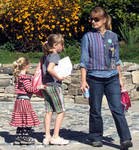7 x7 Seven Subjects & 7 things I learned Day 130 &
131
1. Math
a. In math today I learned how to multiply
and simplify expressions using variables. The trick is to squish the numbers
together and then multiply, like 5x * 3y = 15xy
b. I learned that when you have two of the
same number variables like 6x * 2x the answer is not 12xx, it is 12xsq.
c. (-7y) (-2) (-x) (-y) = 14xsq.
d. (8g) (-2gh) = 16gsq.h.
e. (-9a) (-5b) (1/9a) = 5asq.b
f. (10w) (0.1) (2w) = 2wsq.
g. (163v) (0)v (6x) = 0
2. Science
a. In Science today I learned about nuclear
energy, I learned that in 2009, approximately 14 percent of all of the world’s
electricity was produced by nuclear power stations.
b. The bomb that was dropped on Hiroshima
showed the destructive power of nuclear energy.
c. I learned that small amounts of nuclear
fuel react; the resulting heat is transferred to water, the water turns into
steam that spins the turbines and produce electricity.
d. The electricity made by nuclear energy
is transferred by transmission wires to homes and businesses.
e. I learned that scientist Marie Curie
discovered uranium which is an atom that is mainly used to create energy and
nuclear power.
f. I learned that in some ways nuclear
energy is the safest, cleanest, cheapest, and best option for energy, but it is
also very dangerous if a nuclear power plant malfunctions.
g. I learned that process of how nuclear
power is created.
3. History
a. Most people in Egypt lived in villages,
in sun-baked mud brick houses that were crammed close together.
b. The homes of wealthy merchants were
spacious and comfortable unlike a tomb-workers house.
c. I learned that the Nile river was the
thing that made it possible for the Egyptian civilization to grow in the harsh,
dry, climate.
d. I learned that the Egyptians invented
the first irrigation system. They dug canals to direct the water from the Nile
to the crops. Later the Egyptians built reservoirs to hold the water, so that
they would have it for the dry season.
e. I learned that Egypt was one of the
first socialites to grow crops, and they were also one of the first groups of
people to tame animals and breed them for work or food.
f. I learned that the Egyptians might have
been the first people to make wine and brew beer.
4. Language
a. Today in Spanish I practiced conjugating
the verbs Estar and Ser
b. I also practiced and learned the months.
c. I lrearned how to say my birthday “Es
trieta la una el Agosto, es el cumpleanos de mi.” August 31st is my birthday.
d. I learned that from one to thirty,
numbers are written as one word, from thirty one- it is two words.
e. I practiced sorting male nouns and
female nouns in different lists.
f. I learned the names of the months in
Spanish. Enero, Febrero, marzo, abiril, mayo, junio, Julio, agosto, septiembre,
octobre, noviembre, diciembre.
g. I practiced my Spanish vocabulary.
5. Reading
a. In reading today I read a poem by Emily
Dickinson called, “If you were coming in the fall.”
b. I practiced figuring out the conflict in
the story and finding metaphors and similes.
c. What is the main conflict in the poem?
The speaker does not know when she will see
her love again
d. What does the speaker say is here main
worry?
She is “uncertain of the length” of time
until she sees her love again.
e. Which one of these is a metaphor used in
the poem?
Comparing the months to a ball of yarn
f. Which one of these is a simile used in
the poem?
Comparing the summer to a housefly
g. Which one of these is a good summary of
the poem and its conflict?
6. Writing
a. In writing today, I learned about
persuasive writing. Persuasive writing is a way to show your opinion and try to
make people feel or act in a certain way.
b. I read a paragraph that used persuasive
writing about putting a 20 minute free library period in every middle school
where students could go into the library and have free reading time.
c. I wrote a writing block stating my
opinion and respond to Daniel’s article. (Daniel was the author of the free
reading time library thing.)
d. My response:
“I agree with Daniel’s article and think
that all students should have choice of their books and should have a set time
and break from classes to sit quietly and read their books in the library. I
think that the library should be open both before school and after giving
students free willing motivation to read more often.”
7. Music

No comments:
Post a Comment